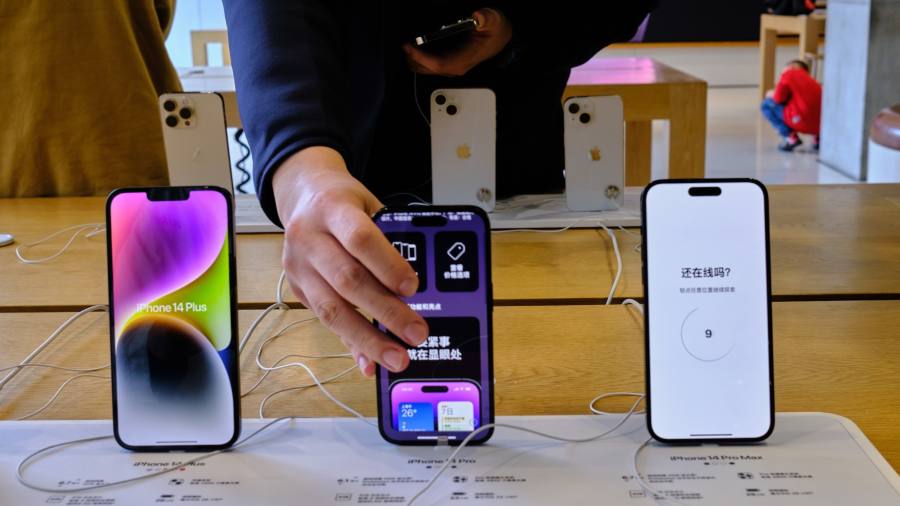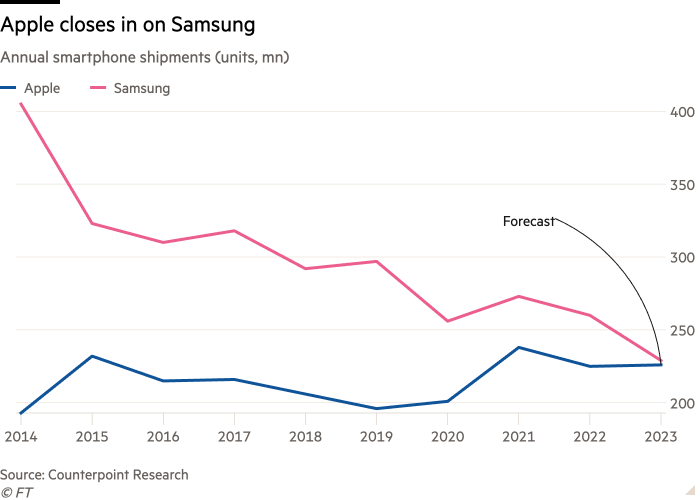
Receive free Apple Inc updates
We’ll send you a myFT Daily Digest email rounding up the latest Apple Inc news every morning.
Investor alarm that China may be cracking down on officials’ iPhone use has knocked $200bn off Apple’s market value, casting a shadow over next week’s launch of its latest smartphone.
Beijing’s reported curbs on government iPhones, alongside a resurgent Huawei, threaten to derail what should have been a moment of triumph for Apple: unseating Samsung at the top of the smartphone market.
Before the China turmoil, analysts had predicted that the launch of the iPhone 15 would put Apple within reach of becoming the world’s biggest smartphone maker by volume for the first time.
However, Apple’s shares have fallen by about 6 per cent over the course of the past two days, as investors fretted about its fate in China, which makes up roughly a fifth of its revenue.
“A decade ago it seemed inconceivable that Apple could wrestle the top spot from Samsung but it could be that we’re on the cusp of that milestone,” said Ben Wood, analyst at CCS Insight. “They will be tantalisingly close but the Chinese market will play a pivotal role.”
Several reports surfaced this week suggesting that Beijing has ordered public officials in certain government departments not to use iPhones or other foreign devices for work.
Bank of America has estimated that China accounts for up to 50mn in annual iPhone sales and that such a ban could cost Apple 5-10mn units a year.
There has been no official word from the Chinese government on the issue. Apple declined to comment on any ban, which was first reported by The Wall Street Journal.

At the same time, Apple is facing the unexpected return of its toughest rival in China: Huawei.
Last week, China’s “national champion” released a new flagship phone, the Mate 60 Pro, which appears capable of delivering 5G speeds despite Washington-led efforts to hinder Huawei’s ability to source advanced chips.
Washington’s imposition of sanctions against the Chinese telecoms group since 2019 had proved devastating. Huawei’s smartphone market share in China fell from 29 per cent in mid-2020 to just 7 per cent two years later.
However, the Mate 60 Pro — which starts at Rmb 6,999, about $970 — has in the past week been flying off the shelves. Analyst Ming-Chi Kuo of TF International Securities estimated Huawei could ship up to 6mn units of its latest model by year-end, lifting its total 2023 shipments by 65 per cent to 38mn.
The overall smartphone market is set to decline in 2023 for a second consecutive year, to 1.145bn units, the lowest in a decade. As competition from Huawei receded, Apple’s global market share has grown from 15 per cent to 20 per cent over the past decade.
Apple is set to release four new iPhone 15 models on Tuesday. Improvements to the new model are expected to be incremental, with a switch to industry-standard charging ports — a change forced upon it by new Brussels rules on device makers — among the expected updates.
Nonetheless, Wall Street analysts predict there are enough iPhone owners among its 1.2bn-strong customer base looking to upgrade for Apple to sell upwards of 78mn devices in the busy December quarter. That would mark a gain of 8 per cent from a year ago, when Covid-19 protests in China disrupted iPhone production.
Analysts at Counterpoint Research project that might be enough for Apple to outsell Samsung this year, by unit volume. That would grant Apple the global smartphone sales crown for the first time, 16 years after the iPhone went on sale. Both smartphone makers are expected to sell just under 230mn units in 2023, Counterpoint estimates, making the race too close to call ahead of the new iPhone’s unveiling.